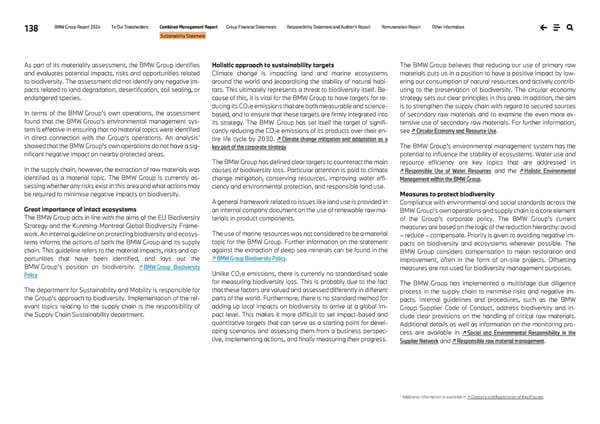138 BMW Group Report 2024 To Our Stakeholders Combined Management Report Group Financial Statements Responsibility Statement and Auditor’s Report Remuneration Report Other Information Sustainability Statement As part of its materiality assessment, the BMW Group identifies and evaluates potential impacts, risks and opportunities related to biodiversity. The assessment did not identify any negative im- pacts related to land degradation, desertification, soil sealing, or endangered species. In terms of the BMW Group’s own operations, the assessment found that the BMW Group’s environmental management sys- tem is effective in ensuring that no material topics were identified in direct connection with the Group’s operations. An analysis* showed that the BMW Group's own operations do not have a sig- nificant negative impact on nearby protected areas. In the supply chain, however, the extraction of raw materials was identified as a material topic. The BMW Group is currently as- sessing whether any risks exist in this area and what actions may be required to minimise negative impacts on biodiversity. Great importance of intact ecosystems The BMW Group acts in line with the aims of the EU Biodiversity Strategy and the Kunming-Montreal Global Biodiversity Frame- work. An internal guideline on protecting biodiversity and ecosys- tems informs the actions of both the BMW Group and its supply chain. This guideline refers to the material impacts, risks and op- portunities that have been identified, and lays out the BMW Group’s position on biodiversity. ↗ BMW Group Biodiversity Policy The department for Sustainability and Mobility is responsible for the Group’s approach to biodiversity. Implementation of the rel- evant topics relating to the supply chain is the responsibility of the Supply Chain Sustainability department. Holistic approach to sustainability targets Climate change is impacting land and marine ecosystems around the world and jeopardising the stability of natural habi- tats. This ultimately represents a threat to biodiversity itself. Be- cause of this, it is vital for the BMW Group to have targets for re- ducing its CO2e emissions that are both measurable and science- based, and to ensure that these targets are firmly integrated into its strategy. The BMW Group has set itself the target of signifi- cantly reducing the CO2e emissions of its products over their en- tire life cycle by 2030. ↗ Climate change mitigation and adaptation as a key part of the corporate strategy The BMW Group has defined clear targets to counteract the main causes of biodiversity loss. Particular attention is paid to climate change mitigation, conserving resources, improving water effi- ciency and environmental protection, and responsible land use. A general framework related to issues like land use is provided in an internal company document on the use of renewable raw ma- terials in product components. The use of marine resources was not considered to be a material topic for the BMW Group. Further information on the statement against the extraction of deep sea minerals can be found in the ↗ BMW Group Biodiversity Policy. Unlike CO2e emissions, there is currently no standardised scale for measuring biodiversity loss. This is probably due to the fact that these factors are valued and assessed differently in different parts of the world. Furthermore, there is no standard method for adding up local impacts on biodiversity to arrive at a global im- pact level. This makes it more difficult to set impact-based and quantitative targets that can serve as a starting point for devel- oping scenarios and assessing them from a business perspec- tive, implementing actions, and finally measuring their progress. The BMW Group believes that reducing our use of primary raw materials puts us in a position to have a positive impact by low- ering our consumption of natural resources and actively contrib- uting to the preservation of biodiversity. The circular economy strategy sets out clear principles in this area. In addition, the aim is to strengthen the supply chain with regard to secured sources of secondary raw materials and to examine the even more ex- tensive use of secondary raw materials. For further information, see ↗ Circular Economy and Resource Use. The BMW Group's environmental management system has the potential to influence the stability of ecosystems. Water use and resource efficiency are key topics that are addressed in ↗ Responsible Use of Water Resources and the ↗ Holistic Environmental Management within the BMW Group. Measures to protect biodiversity Compliance with environmental and social standards across the BMW Group’s own operations and supply chain is a core element of the Group’s corporate policy. The BMW Group's current measures are based on the logic of the reduction hierarchy: avoid – reduce – compensate. Priority is given to avoiding negative im- pacts on biodiversity and ecosystems wherever possible. The BMW Group considers compensation to mean restoration and improvement, often in the form of on-site projects. Offsetting measures are not used for biodiversity management purposes. The BMW Group has implemented a multistage due diligence process in the supply chain to minimise risks and negative im- pacts. Internal guidelines and procedures, such as the BMW Group Supplier Code of Conduct, address biodiversity and in- clude clear provisions on the handling of critical raw materials. Additional details as well as information on the monitoring pro- cess are available in ↗ Social and Environmental Responsibility in the Supplier Network and ↗ Responsible raw material management. * Additional information is available in ↗ Glossary and Explanation of Key Figures.
 BMW Group Report 2024 Page 137 Page 139
BMW Group Report 2024 Page 137 Page 139